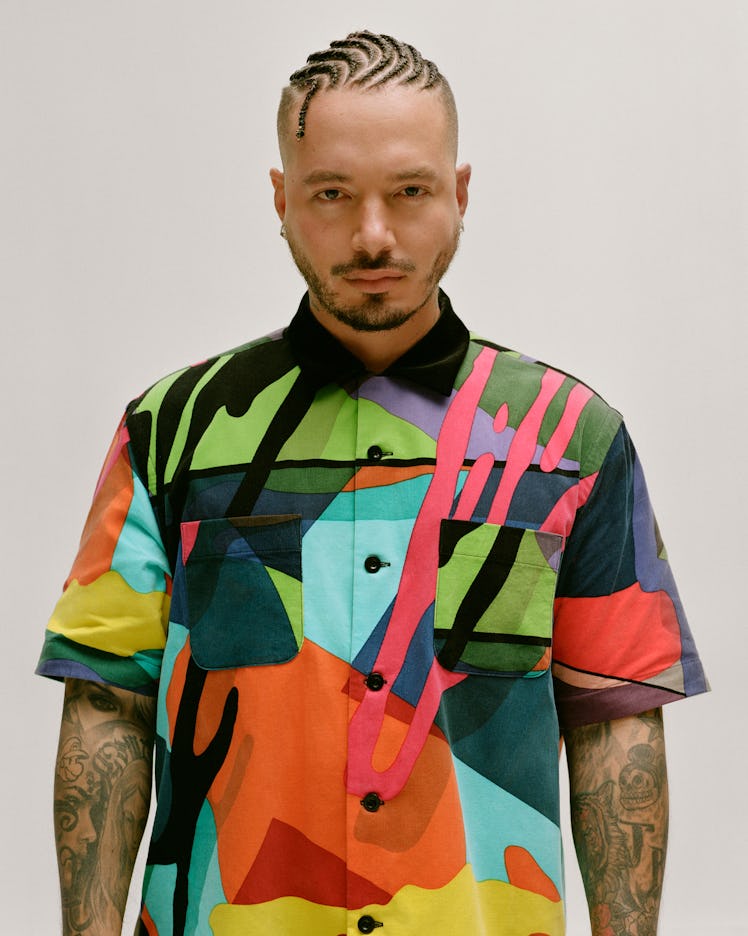J Balvin Gets Personal
With a new documentary, The Boy from Medellín, and a new album, the Colombian star is on a mission to change the perception of Latinos in music.

José Álvaro Osorio Balvín, who is known by millions as J Balvin, has opened up during the past few months in ways he couldn’t have possibly foreseen at the start of his career. The prolific Colombian pop-reggaeton artist—the first ever to play his own set at Coachella—is proud of his home country. It’s very much the basis for his new documentary The Boy From Medellín which follows him during a week in his life in 2019. Throughout the Amazon Studios film, Balvin struggles with how to speak out about Colombia’s history of political turmoil while also revealing his own mental health issues, which he addresses for the first time in his upcoming album Jose. Last week, as Colombians took to the streets in protest of President Ivan Duque’s government and its police force, Balvin took to social media to call for peace and an end to the violence. The following interview for W’s annual Music Issue was conducted months before the uprising in Colombia. Here, the musician goes into detail about the intimate direction of his music, discrimination against Latinx people and his real stance on the Latin Grammys.
When you have five albums, dozens of awards under your belt, and millions of listeners worldwide, your fans might feel like they already know what there is to know about you. But apparently, on your forthcoming album, your music gets truly personal for the first time. What will you be opening up about?
I talk about my anxiety, my depression. I talk about how hard it was for me, being Colombian in a Puerto Rican game, trying to get the respect of the whole world. I talk about my mom, and my relationship with my dad when he used to be my manager—when I had to step back and be like, “I love you, Dad. And I think it’s better to just have you as my dad.” The album is all about fears. And really, it’s an evolution of me as an artist, lyrically and sonically.
Raf Simons jacket and sweater.
Dior Men’s jacket and pants; Outerknown T-shirt; his own ring.
What made you decide to dig so deep for this album?
The last album that I did was a conceptual one; it was more about colors. When the pandemic started, I was like, Oh, I’ve got to do an album right now. I wanted it to be about me as a person so I could just do whatever I wanted. I was in Colombia, so I was like, I’m back in my country. I’m back in my city. I’m back with my people. I’m stuck here. It has to be for a reason. I think that’s why life wanted me to be there. I made more than 100 songs in a year.
In 2020, you led the Latin Grammys with the most nominations. But in 2019, you had spoken out against the awards show, not attending the ceremony and pointing to the exclusion of reggaeton and trap artists like Nicky Jam and Maluma from the major award categories, despite their being some of the most popular performers in the world. What do you think caused the shift between last year and the year before?
I just thought we deserved more. I took a risk and I was like, I’m not going. When it comes to Latin music, what we’re doing culturally is so powerful. And I’m not talking about me—I’m talking about Anuel AA; I’m talking about Ozuna, Daddy Yankee. But I don’t want the Grammys to use us for ratings. I want them to really value what we do in our art. One of my missions is to change the perception of Latinos in music.
Balenciaga jacket, jeans, and shoes; his own T-shirt.
Sittings editor: Sita Abellan; grooming by Diego Larez for Ziba Cool; photo assistants: Amelia Hammond, Alonso Ayala; retouching: Hempstead May; fashion assistant: Julia McClatchy.
How would you describe that perception?
The perception has always been kind of whack, tacky. It’s about teaching, reintroducing to a new generation, which is way more open-minded. Our music has gotten to a global status—I was the first Latino artist to be the most listened to artist on the planet a couple of years ago, and I’m still in the Top 10. That wasn’t luck. Something real is going on with the music and the way we’re connecting to the people. Everywhere we go, we feel our music. I’m not a flex guy, so I’m never on Instagram like, “I did this and I did that.” But sometimes we’ve got to tell the story. We are making and breaking boundaries. We do cool shit, and we have taste. I just want to keep elevating the culture. And if I can make part of that history, I’m more than happy.